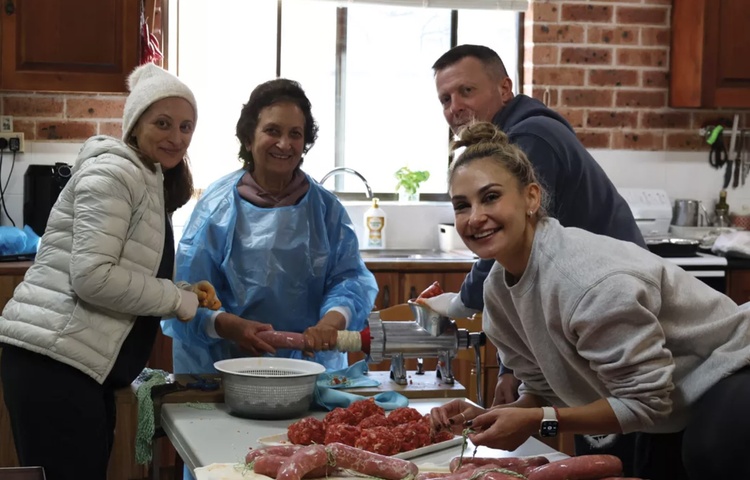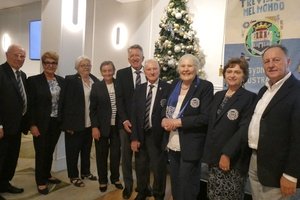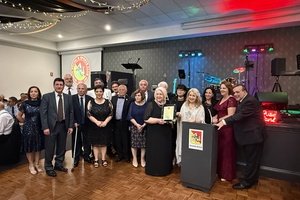The Severino family embodies the Italian tradition that has taken root in Australia.
Antonio and Lisa, with their children Connie and Maria, carry forward a practice from their Calabrian roots: preparing homemade salamis.
“The earth never lies. It gives back what it gets and gives to whoever tends to it a direct and concrete knowledge of the world. It’s a school of humility and truth, where one learns one’s limits and respect for natural laws,” wrote the French philosopher Gustave Thibon.
This concept is particularly relevant for families such as the Severinos, who continue rich cultural and culinary traditions from Italy that have enriched Australian culture.
Antonio and Lisa met 53 years ago in Santa Caterina dello Ionio, Calabria, immediately after Antonio returned home at the end of the Vietnam war. They fell in love, married and moved to Australia, where Lisa makes salamis with the same passion of her ancestors.
“I learnt from my parents, who would make everything at home,” Lisa recounts. “It was a beautiful surprise [for them] when I started to make them independently.
The Severino family welcomed us into their garage, transformed into a laboratory for making every kind of Italian staple with a big kitchen to accommodate all other family members: Maria and Connie, with her husband Paul Mezzanotte.
“My parents and grandparents left Italy before these traditions started to disappear, so they brought them here and inspired us to continue them. In 1971, they left Italy, and my mum didn’t return to Italy for 30 years. So, everything she carried with her, stayed,” Connie explains.
The process of making salami begins with the meat, which must be minced and seasoned with a mix of spices – chilli, salt and pepper – and, depending on the regional recipe, other ingredients like garlic, wine and herbs.
This mix is packed into natural casings, and the salamis are then hung in dry places to be aged. The process can last from a few weeks to many months.
Like a well-planned choreography, everyone in the Severino family has a specific role, borne out of years of practice.
Paul puts the meat in the machine to fill the salamis, while Lisa grasps the casings to make sure the meat doesn't fall out. Once the salamis are filled, Connie takes care of tying them. Meanwhile, Maria pierces the salamis to let out potential air bubbles. With the help of her dad, she hangs them from the ceiling to be aged.
“These family rituals are a chance to feel more connected,” explains Maria. “We grew up surrounded by nonni, and our parents continued the traditions. For us, it was a natural way of life; we couldn’t wait for these special days to arrive: the sauce day, the salami day, the wine day.
“We want to keep the tradition alive. It’s a chance to share special times together, and it’s steeped in our Italian roots and deepens family ties.”
When asked how she’s conveyed the passion for making salamis and other typical foods to her kids, Lisa has this response: “They enjoy it, and when something is enjoyed, it’s done with love.”
Lisa recalls that, when salamis were made in Italy 60 years ago, no one had garages or big spaces to age them. “Wherever there was space, they were hung. Now there’s all this convenience, but once there wasn’t. You had to get by. We always keep this spirit with us.”
In an era of advanced technology and frenetic routines, the Severino family exemplifies a timeless authenticity. Modernity has brought conveniences that have facilitated the production process, but for this family, dedication and love for tradition remains unchanged.
They not only maintain their cultural roots, but convey values of collaboration, togetherness and patience to their children.
“I hope to leave them this legacy, because I found the best one imaginable through my parents: the beauty of simple, genuine things, the love for family and the earth, helping and respecting each other always,” Lisa emphasises. “Many families here make homemade goods. We’re just one of many to continue the tradition.”
This story is both a tribute to Italian culinary traditions and an appeal to the importance of preserving specific identities in an ever more globalised and automated world.
The Severino family opened the doors of their house, encouraging us to participate and making us immediately feel a part of something. This is the very secret of their hospitality.
The inclusivity and warmth with which they welcome people makes their house a special place, where anyone can feel at home. Their generosity and helpfulness have no bounds.
The experience reinforced in us the conviction that true wealth lies in human relationships and sharing moments together.
As Thibon said, “Time dedicated to the earth is never lost. It returns in an infinite harvest of spiritual and moral good.”
Contact us to share your experiences of making Italian products at home.












